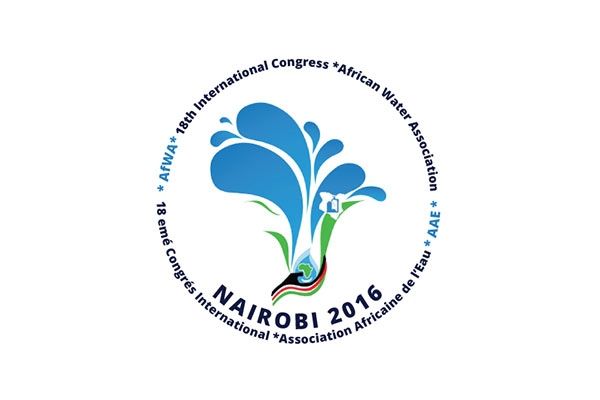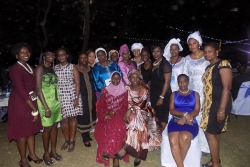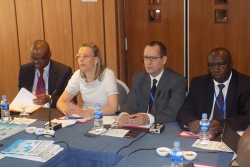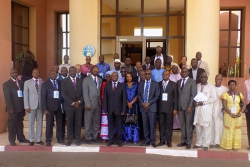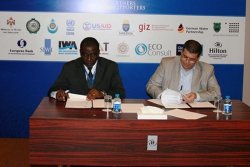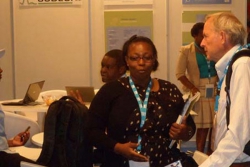Plus...
Qu’est ce qu’une eau agressive et pourquoi la traite-t-on ?
Une eau agressive est une eau qui contient un excès de gaz carbonique encore appelé anhydride de carbone ou acide carbonique. Pour favoriser un état qu’équilibre afin d’éviter tout dépôt d’éléments chimiques de l’eau, la présence du gaz carbonique est indispensable.
Mais, lorsqu’il subsiste dans l’eau une quantité supérieure à celle nécessaire pour maintenir cet équilibre, l’excès, qualifié d’agressif, attaque le carbonate de calcium et engendre la corrosion des matériaux métalliques des canalisations de transport de l’eau et des réservoirs de stockage. Cette dégradation des matériaux constituant les conduites, est responsable de la diminution rapide de la durée de vie de ces ouvrages entraînant des fuites et des casses sur les réseaux de distribution.
La corrosion des équipements de distribution et de stockage induit la formation de rouille (selon le matériau intervenant dans leur fabrication) responsable d’eaux rouges, de mauvais goût et d’odeur suscitant de nombreuses plaintes de consommateurs. Le gaz carbonique agressif dans l’Eau de boisson n’étant pas à lui seul toxique aux consommateurs, les effets secondaires dont il est responsable lors des interactions entre l’eau distribuée et les conduites de transport font que son élimination est jugée parfois incontournable afin de livrer aux populations de l’Eau de qualité irréprochable.Quels types de traitements doit-on appliquer à une eau agressive ?
Le type du traitement d’une eau agressive dépend d’autres caractéristiques physico-chimiques de l’eau, notamment, son alcalinité, sa conductivité et son potentiel hydrogène.
Par exemple, lorsqu’il s’agit d’une eau faiblement minéralisée, le traitement est choisi de manière à réduire, non seulement, le caractère agressif de l’eau, mais à rehausser sa minéralisation. Toujours suivant le taux du gaz carbonique présent dans l’eau sous traitement, un traitement physique (aération, dégazage forcé, pulvérisation etc) peut s’avérer nécessaire pour éliminer une partie du gaz carbonique avant de neutraliser le reste à l’aide d’un produit alcalin ou alcalino-terreux. Dans le cas où l’eau est naturellement minéralisée mais agressive, le traitement physique est suffisant pour la ramener à l’équilibre carbonique.
L’objectif final de ce traitement est de produire une eau proche de l’équilibre calco-carbonique, c'est-à-dire une Eau légèrement calcifiante avec un Glossary Link pH voisin de celui de son équilibre (LEROY, 1999) afin d’éviter tout phénomène de corrosion.
Que faire lorsqu’on a des doutes sur la qualité de l’eau ?
La qualité de l’eau distribuée à travers les réseaux et livrée au robinet des consommateurs constitue l’un des aspects de l’alimentation en eau potable auquel les clients sont sensibles et qui doit constituer l’une des importantes priorités des producteurs de l’eau potable et des autorités sanitaires. Les producteurs doivent alors prendre les dispositions idoines pour que l’eau livrée satisfasse non seulement aux exigences en matière des normes légales de potabilité, mais pour un suivi rigoureux de la qualité. Mais malgré ces précautions, plusieurs phénomènes peuvent être à l’origine de l’altération de la qualité de l’Eau au cours de sa distribution, et qui échappent complètement au contrôle du producteur. Il s’agit notamment de :
- introduction d’eau sale dans les réseaux lors de travaux de réparation de casse, d’entretien ou de pose de nouvelles conduites
- retour d’eau suspecte provenant des réservoirs privés mal entretenus.
- Fuites non maîtrisées engendrant l’infiltration d’eaux souillées en cas de dépression etc…
Alors lorsqu’un consommateur doute à raison de la qualité de l’eau à son robinet, il devra prendre contact avec la société de distribution d’eau. En cas de nécessité, le service touché enverra un technicien sur place pour des investigations et échantillonnage éventuellement d’eau et les anomalies constatées seront immédiatement réparées.

 Français
Français  English
English 
